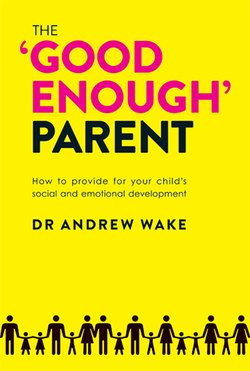The 'Good Enough' Parent

Реклама. ООО «ЛитРес», ИНН: 7719571260.
Оглавление
Andrew Wake. The 'Good Enough' Parent
CONTENTS
INTRODUCTION
CHAPTER 1. ATTACHMENT:GETTING ENOUGH
ATTACHMENT AND SAFETY
Michael’s amazing mother
ATTACHMENT BEHAVIOURS
Jack
David’s story
ATTACHMENT AND EMOTIONS/RELATIONSHIPS
ATTUNEMENT
CHAPTER 2. SEPARATION: MISSING OUT ENOUGH
Olivia
THE NEED TO SEPARATE
GRIEF AT MISSING OUT
Gary
Sibling rivalry
DISAPPOINTMENT AND HATE AT MISSING OUT
Sarah
GETTING OVER GRIEF AND HATE
Claire
Liam
CHAPTER 3. THE AMAZING BRAIN
THREE BRAINS IN ONE
Charlotte
Jasmine
THE BRAIN HIERARCHY AND HANDLING STRONG EMOTION
CHAPTER 4. YOUR APPROACH IS EVERYTHING
A PLAYFUL APPROACH
Sam and Jakob
Sarah and Maisie
A SUPPORTIVE APPROACH
Saving and supporting at a funeral
A REPAIRING APPROACH
Amy
AN EXPERIENCED APPROACH
A COOPERATIVE APPROACH
CHAPTER 5. PROVIDE ENOUGH SAFETY
Jason
THE FOUR-STAGE PLAN
CHAPTER 6. PROVIDE FOR THEIR BASIC NEEDS
Connor
THE NEED FOR RITUAL, ROUTINE AND REPETITION
THE NEED FOR COMMUNITY CONNECTIONS
THE NEED FOR BOREDOM
THE NEED TO MISS OUT
THE NEED TO AVOID PREMATURE ADULT EXPERIENCES
CHAPTER 7. PROVIDE ENOUGH UNITY
UNITY BETWEEN PARENTS
Tran
UNITY WITH OTHER ADULTS
A values mismatch?
HANDLING DISUNITY
CHAPTER 8. PROVIDE ENOUGH AFFECTIONATE CARE
Frances
THE BASICS OF CARING ENOUGH
Adrian
WHAT IF THE CHILD IS NOT THOUGHT WELL OF?
CHAPTER 9. PROVIDE ENOUGH BOUNDARIES
Adam
EXTERNALISING THE RULES
The warring sisters
CREATING VALUES-BASED BOUNDARIES
Lucas
Sam
SETTING EFFECTIVE CONSEQUENCES
A logical consequence
Ask what, not why
CHAPTER 10. REFLECT MORE, REACT LESS
The power of the broken record
Not looking away
COMBINING REFLECTING AND RESPONDING
Ben and Nick
Sarah and Cathy
Jade and Liz
BIBLIOGRAPHY
ACKNOWLEDGEMENTS
Отрывок из книги
DR ANDREW WAKE is a child and adolescent psychiatrist with extensive experience in both public and private practice. He has worked in a range of settings, from leafy suburbs to rural townships and remote Aboriginal communities. He has lectured at the University of Melbourne, and also undertaken numerous speaking engagements at mental health clinics, schools and child protection units on topics such as parenting, child development, adolescent sexuality and the effects of childhood trauma. He lives in Melbourne with his wife and three children. This is his first book.
This book is different to the many parenting books out there that attempt to teach you how to ‘manage’ your child, though this one still contains plenty of case studies and useful strategies. Instead, my aim is twofold; firstly, to help you understand how children’s early experiences and their amazing brains work together to influence their social and emotional development, and secondly, to explain what you can do to provide what children need for healthy development.
.....
This is where children demand help (and therefore your attention) to solve a problem. It is more than asking for assistance to deal with their own problem (which is known as ‘affiliation’ – a mature way of coping). Effectively they are making their problem your problem and demanding that you save them by solving it. It is the immature but powerful way of coping with distress discussed at the beginning of the chapter: when overwhelmed by something, they look to their protector to take the responsibility for the problem, and to soothe and save them.
Be very careful that you do not automatically rush in and take over. Even though you might think that this is ‘helping’ your child, and even satisfying his need for attention, in the long term it may reduce his problem-solving abilities and his resilience.
.....